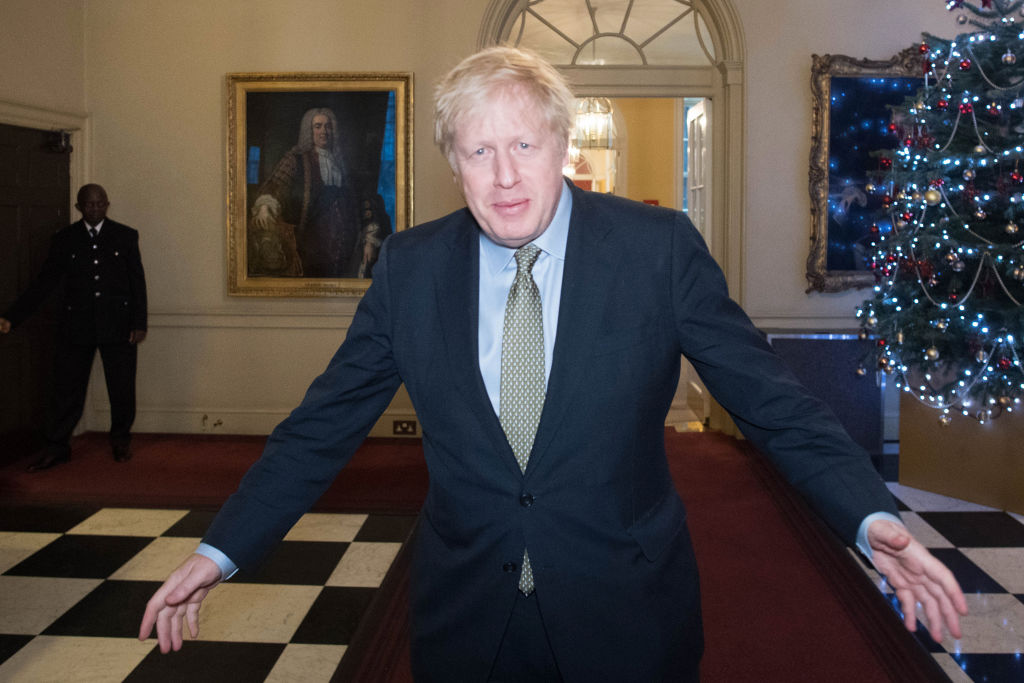First, a clarification. I may previously have suggested that Boris Johnson is an unprincipled egomaniac wholly lacking in both moral character and political judgement. I may have intimated that he does not possess the empathy or imagination a prime minister requires and that he would neither lead his party to a crushing election victory nor deserve to. I now acknowledge that he is, in fact, one of the great political leaders of our lifetime, an English Charles de Gaulle arriving in the nick of time to rescue his country from its own folly. If that means rewriting the rules then let them be rewritten for we shall all be the better for it. In years to come we shall speak of him as a twenty-first century Benjamin Disraeli.
With that misunderstanding cleared up, it would be churlish as well as absurd to deny the scope and scale and extent of the victory the Conservative party won this week. If the final result was not quite as exuberant as the exit poll initially suggested it was more, much more, than enough. A victory towards the upper end of what seemed possible, let alone probable. Boris triumphant; Boris unleashed.
That means pre-election expectations of what, beyond Brexit, this government will do are now worth very little. The political map has been rewritten and old assumptions should not be afforded too much weight. Even so, some possibilities are already apparent: this will have to be a more vigorous Conservative government. There will be times when, for all his own distaste for the current Tory party, its approach to regional and industrial policy will owe something to Michael Heseltine’s school of Tory interventionism. The north (of England, that is) will require it.
Grand projects, then, seem likely to be twinned with an ongoing culture war in which “owning the libs” is a new and much-enjoyed Tory blood sport. Dominic Raab and Priti Patel hold prominent positions for a reason. That means a brand of muscular Tory populism that will infuriate many voters and make squeamish Tories slightly nervous. This is a means of drawing attention away from the inconvenient reality there is, as yet, no truly coherent ideological or even philosophical view underpinning the new government’s agenda. An awful lot of the government’s political capital is wrapped up in the prime minister’s persona and credibility. That is a strength, for now, but it is not difficult to see how it could easily become a weakness.
Modesty in victory is always prudent. For eventually the wheel must always turn. Tory triumphalism ought to be tempered by an awareness of their good fortune. The party’s share of the vote was only 1.2 per cent higher than that achieved by Theresa May in her calamitous election two years ago. That is, to be sure, an achievement but it is one greatly assisted by the Labour party’s appointment with Dignitas.
Jeremy Corbyn was the worst, least attractive, would-be prime minister presented to the British people in living memory. No other leader of the opposition has had such miserable approval ratings in the history of polling. He is a record-breaker. Even if Corbynism does not perish – though it should and deserves to – Corbynism presented by almost anyone else not named Richard Burgon must be a more attractive proposition than Corbynism fronted by Jeremy Corbyn.
And a mainstream, social democratic, Labour party could easily find itself back in the game in short order. The Tory party’s weakness with young voters – defined now as anyone under 50 – is a real weakness showing little sign of changing soon. It is, if anything, in a still weaker position with ethnic minority voters. This should occasion some Tory modesty too. Johnson has thumped Jeremy Corbyn but Jeremy Corbyn is no Joe Frazier and Boris Johnson no Muhammad Ali.
Indeed, as Robert Colvile, director of the Centre for Policy Studies, quipped last night: the simplest explanation of this result, when contrasted with that from two years ago, is that in 2017 no-one thought Jeremy Corbyn could become prime minister but yesterday they did.
Other problems loom. Brexit, of course, because Brexit will be with us as a practical matter for some time yet and the government’s ability to deliver on its self-proclaimed “One Nation” agenda will be constrained if Brexit has the disagreeable impact on the British economy that, at least in the short to medium term, still seems more than possible.
And then there is Scotland, of which more another time, but note only this: the Prime Minister might talk in terms of One Nation Toryism but this was an election which showed the limits of that rhetoric. The gulf between the Home Counties and the Rust-Towns of northern England is as nothing now to the gulf between England and Scotland. That matters and there is a sense, a palpable sense, of a conscious uncoupling taking place now. The full effect of that will not be felt for some time, for these things are not as immediate as the flicking of a switch. But that there will be an effect does not seem greatly in doubt.
A famous triumph, then, but also one that requires contextualisation. Johnson defeated a Labour party determined to defeat itself and the realities of Brexit Britain have not magically disappeared either.
For the moment, he has earned this victory and it would be absurd not to allow that he has, at least for now, proved many of us wrong. But there remains the nagging suspicion nonetheless that this has been, relatively-speaking, the easy bit.







Comments